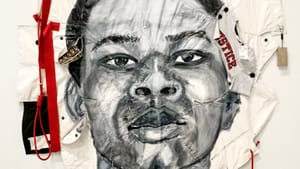Stay in the Loop
BSR publishes on a weekly schedule, with an email newsletter every Wednesday and Thursday morning. There’s no paywall, and subscribing is always free.
The roots remain
Asian Arts Initiative presents ‘ABOLITION NOW!’

ABOLITION NOW!, on view at Asian Arts Initiative (AAI), examines the stakes for Asian Americans in abolition and imagines a world without state-sponsored violence against Black and brown communities. The multidisciplinary exhibition includes video, mixed media, prints, photography, and projection by a wide variety of artists and community organizations including Youth Art & Self-Empowerment Project and People’s Paper Co-op.
The word abolition might conjure up the antebellum movement to end slavery in the US, but the spirit of that fight is alive today. For example, modern abolitionists call for the end of the Department of Homeland Security’s Immigration and Customs Enforcement agency (ICE) and the abolition of policing, prisons, and any form of state-sponsored violence, especially as it disproportionately affects people of color.
Mockery and witness
The main gallery at AAI is a spacious room with a well-designed layout for visitors. While admiring the art, you can hear children’s voices in the background, engaging in AAI programs. This background noise added to the experience, offering a real-time reminder of the urgency to reshape our society in a way that is safer and more supportive for marginalized communities.
Russell Craig’s Mockery was the first piece to draw my eyes. It is a mixed-media piece: a painted portrait of a young Black man on the canvas of a deconstructed Burberry coat. There is also a red belt shaped into a noose hanging from the piece. The boy is staring straight ahead with an intense gaze, not defiant or angry but demanding you to acknowledge his humanity. The piece confronts the fashion industry’s historical and ongoing appropriation of Black culture as well and its numerous instances of using anti-Black imagery in designs.
Next is Land Witness, a series from poet Karla Robinson and photographer Kamal Badhey. The series was born after the artists visited the Japanese internment camp known as Rohwer War Relocation Center. There are five pieces included in the series showcased, each displaying a poem accompanied by photo. One that struck a strong chord in my heart is a photo depicting decayed flowers resting on some sort of engraved step, bench, or tomb. It’s paired with a poem that reads,
They can try to wipe clean
the stain of internment
Give reparations
But soil remembers all.
The roots still remain.
An abolitionist future
Many are still uneducated on how policing, prisons, and detention have affected Asian Americans throughout United States history. This series shines a light on the thousands of Japanese Americans who were uprooted from their homes after the bombing of Pearl Harbor and placed in concentration camps, imprisoned for years. It is the duty of a country and the human race to learn from its errors, and to evolve in the best interests of everyone, not just a privileged group with power. Knowledge is the first step to progress and ending state-sanctioned violence. Robinson and Badhey use artistic expression as a refusal to be complicit in the erasure of significant moments in American history.
The exhibition also includes art highlighting restorative/transformative justice, racial profiling of Muslim people, mass incarnation, and ICE.
ABOLITION NOW! is an informative and timely exhibition that connects cultural expression to social change and uses art as a vehicle to address harm imposed by the state on Black and brown communities. The show demonstrates how healing can occur through education and art. What does an abolitionist future look like, and how do we get there?
What, When, Where
ABOLITION NOW!, Through August 30, 2019, at Asian Arts Initiative, 1219 Vine Street, Philadelphia. (215) 557-0455 or asianartsinitiative.org.
Asian Arts Initiative is a wheelchair-accessible venue.
Sign up for our newsletter
All of the week's new articles, all in one place. Sign up for the free weekly BSR newsletters, and don't miss a conversation.

 Christina Anthony
Christina Anthony